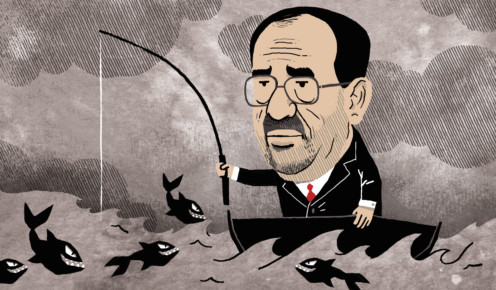
It is rather surprising that anybody is actually surprised at the latest surge in violence throughout the western Iraqi province of Al Anbar, along the Euphrates River. The writing has been on the wall since the Anbaris were crushed after the downfall of Saddam Hussain, 11 years ago. They have been sidelined, quarantined and intimidated, first by the Americans and more recently by the Iraqi government of Prime Minister Nouri Al Maliki. In such fertile anti-government territory, Al Qaida affiliates have mushroomed, feeding off the violence in neighbouring Syria. According to Iraqi sources, the Islamic State for Iraq and Bilad Al Sham (ISIS) has taken over the important cities of Ramadi and Falluja. ISIS has gripped the world’s attention in recent months, as it battled secular rebels in the Syrian warzone. Its leader, Abu Baker Al Baghdadi is a declared affiliate of Al Qaida chief Ayman Al Zawahiri. This week, his men stormed the Falluja Police Station, raised the Al Qaida flag and declared Ramadi a regime-free Islamic emirate. At the time of writing, an ugly street war is on in Ramadi. Armed men are everywhere, conducting house-to-house searches — looking for government collaborators whom they want to put on trial — and execute.
Ten days ago, the army launched a major offensive in Al Anbar to crush Al Qaida militants. This was in response to an attack that killed 18 soldiers on December 21. Iraqi authorities then tore down an anti-government protest site located in Ramadi for an entire year and arrested a prominent Sunni MP named Ahmad Al Alwani, accused of having links with Al Qaida. The Iraqi government described the protest site as ‘headquarters for the leadership of Al Qaida’. On December 21, the Iraqi Army had launched a major offensive in Al Anbar, aimed at eliminating Al Qaida militants.
At first glance, all of this seems like a serious threat to the Iraq-backed Prime Minister Nouri Al Maliki. This is what the western media has been reporting for days. A closer look, however, shows that it may be a blessing in disguise for the Iraqi premier. It gives him the chance to re-invent himself as an ally of the West in its war against Al Qaida. If Al Maliki was searching for a pretext to further crush whatever Sunni opposition he has left in Iraq, he now finds it with the Al Anbar uprising. When Al Maliki first came to power in 2006, the Americans polished his image by nailing Abu Musaab Al Zarkawi, head of Al Qaida in Iraq. Al Maliki took credit — although he actually had nothing to do with Al Zarkawi’s elimination. Al Zarkawi’s death played perfectly into the agendas of the US, Iran and the Iraqi prime minister. Since then, Al Maliki has been steadily positioning himself as a champion of anti-terrorism in Iraq. Sunnis were furious with him, however, for dragging the country completely into the hands of Tehran. Since then, they have had steady demands: Better security, more equal government representation, revoking of the hated de-Baathification laws and a curb on powers of Shiite militias and politicians. Prime Minister Maliki did none of the above.
Speaking from Tehran last Sunday, the Deputy Chief-of-Staff of Iran’s Armed Forces, Brigadier General Mohammad Hejazi, said: “Iraq is our friend and if it needs military equipment or consultation, we will help them.” When asked if this also meant deploying manpower in Iraq, Hejazi said: “I don’t think the Iraqis would need manpower.” He did not rule it out completely. Meaning, all Al Maliki needs to do is ask. Earlier, Al Usama Al Najafi had telephoned his Iranian counterpart Ali Larijani and asked for Iranian assistance to restore law and order in Al Anbar. The Iranians, who are now in the third month of the first phase of their agreement with the US, are eager to consolidate their power throughout the Arab world. Their Lebanese proxy Hezbollah is engaged in war in Syria, standing rank and file behind President Bashar Al Assad. They refuse to share Iraq or Syria with Saudi Arabia. In fact, they refuse to share Iraq and Syria with anybody. The flourishing of ISIS in both countries is music to the ears of the Iranians.
Fertile ground
The huge province, which borders Syria, Saudi Arabia and Jordan, was bound to suffer its share of violence as Islamic militants have been freely crossing the border, in and out of Syria, for two years now. The quality of water is poor in Al Anbar. Electricity remains inconsistent and more than half of all households suffer from major power cuts. In 2009, unemployment officially stood at 20 per cent. The real number was clearly much higher. According to a 2009 report by the RAND Corporation, “70 per cent of the Anbari population can get to a place of worship within 20 minutes, but only about 30 per cent can get to a police station in the same amount of time”. Access to government services and protection is mediocre. The province has suffered from a great brain drain despite the presence of the prestigious University of Anbar. Most of the province’s youth immigrated to Baghdad, searching for better work opportunities, or fled to neighbouring Syria and Jordan. Those who stayed behind found solitude in mosques, which were rapidly being overtaken by radical clerics. Others took up arms, either with Al Qaida or militias loyal to Saddam. With arms came money, power and a sense of defiance.
Al Maliki needs a new battle to polish his credentials. He needs to become relevant, all over again. His role in Iraq — from an Iranian perspective — is still not over. Whether he allowed Al Anbar to go up in flames or was incapable of preventing it, is not really important. The Iraqi premier will use the Al Anbar uprising to re-position himself in the Middle East scene — as an ally of the West in its war on Al Qaida.
Sami Moubayed is a Syrian historian and author of Syria and the USA (IB Tauris, 2012).









